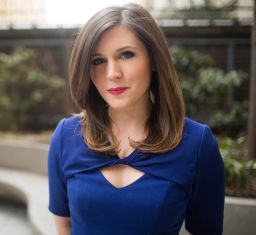Editor’s Note: Jill Filipovic is a journalist based in Washington and the author of the book “The H-Spot: The Feminist Pursuit of Happiness.” Follow her on Twitter. The opinions expressed in this commentary are solely her own. View more opinion articles on CNN.
A record number of women won races in the midterm election, making the incoming Congress the most female and the most racially diverse in American history.

So of course presidential speculation is all about the white guy who lost his Senate race. And indeed on Monday in El Paso, Beto O’Rourke acknowledged that he’s considering running for president in 2020.
Don’t get me wrong, Beto O’Rourke is an inspiring politician, and on a visceral level, I understand Beto-mania.
He’s a mostly progressive politician who nearly won a US Senate seat in Texas, which is no small feat. He’s approachably good looking. He’s personable and engaging, drawing in fans with his social media livestreams – Beto in a minivan! Beto on a run! – and his sincere interactions with voters on tough topics.
His defense of NFL players protesting racism by kneeling during the national anthem, which he made in response to a question from a voter who found that kneeling disrespectful, went viral for good reason: Here’s a politician who, even in the face of a displeased potential constituent, stuck to his guns and engaged a red-hot issue with respect but not blind deference. He has a backbone.
He also speaks in a similar pitch and cadence as Barack Obama and has a similar lanky, slightly goofy handsomeness to him. For those of us who hear Obama speak now and feel a tug of wistfulness – hoping we might again have a president so sincere, so eloquent, so deeply intelligent – Beto feels familiar.
He brings us back to that comfortable time when politics was optimistic. When we were competent. When America seemed to again represent the best of what was possible.
But that ability to feel familiarly inspiring is itself a privilege reserved for men. After all, we still have never had a female president of the United States. While Hillary Clinton motivated many, Americans have yet to experience the familiarity of a female president. There’s no mold, then, for bright, charismatic female candidates to fit into, no space for them to gain an advantage via “she reminds me of…”.
We still understand executive power as male, and so we continue to look to men to occupy it. Perhaps we aren’t looking to the newly elected class of House women, which includes – mark my words – future party superstars like Ayanna Pressley, because they’re fairly green. Fair enough – experience and a long dedication to public service should matter (even if it didn’t with the current President).
But it’s not as if there aren’t women with significant experience in the field of potential presidential candidates. Stacey Abrams also lost a tough race in a red state, but made incredible progress and rightly excited a lot of Georgia voters. Kyrsten Sinema pulled out a squeaker for her Arizona Senate seat, although as a conservative Democrat, she may not be the best national fit.
And of course there are superstar women who are already in the Senate, including Kamala Harris, Kirsten Gillibrand and Elizabeth Warren, who bring experience, expertise and varying degrees of charisma.
We’re talking about all three of them, sure. But there’s no “mania.” That seems to be reserved for the guys.
Perhaps this is because only men are charismatic or exciting? That seems doubtful: Those characteristics have not been distributed to only half the population.
Or maybe it’s because women are held to entirely different and often impossible-to-meet standards. We know that in professional settings, men are promoted and rewarded based on their perceived potential, whereas women have to prove their competence and perform well to be given opportunities.
We see that same dynamic at work here: In this distorted calculation, even the most high-achieving women in Congress haven’t adequately proven that they’re good enough for the job, or they’ve made minor missteps that are magnified and twisted into looking like disqualifying errors.
Gillibrand said Al Franken should resign, so she’s apparently become persona non grata. She was also pro-gun as an upstate congresswoman, although this same demerit does not apply to Bernie Sanders, just because.
Kamala Harris was a prosecutor, which makes her a kind of two-faced Dr. Jekyll / Mr. Hyde progressive / conservative. Elizabeth Warren has, we’re told, an allegedly grating voice, is too much of a national figure (something that tends to help men), and responded to the President’s accusations of lying about her Native American heritage in a way that some on the left found imperfect.
Cast them out!
Beto, though – he has potential.
Never mind that O’Rourke, inspiring as he is, is in fact a fairly moderate Democrat – more conservative in relation to his party than Gillibrand, Harris and Warren. That isn’t disqualifying, but it complicates the (false) narrative of O’Rourke as a true progressive hero in the face of more moderate women.
None of this is meant as a slam on O’Rourke, who I think is great. But it is a nudge to examine the assumptions and biases that give us Beto-mania while conveniently ignoring or actively kneecapping the great many competent, talented, progressive women who could be just as exciting – if only we let go of our deepest biases, embraced the possibility of female power, and let ourselves get excited.



